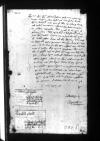Letter #1045
Sigmund von HERBERSTEIN to Ioannes DANTISCUSPoznań (Posen), 1530-10-08
| received Augsburg, [1530]-10-22 Manuscript sources:
Prints:
| ||||||||
Text & apparatus & commentaryPlain textText & commentaryText & apparatus
 Bj, BAS, No. 6. 23, p. [2] unnumbered
Bj, BAS, No. 6. 23, p. [2] unnumbered
Reverendissimo Domino, domino
 Bj, BAS, No. 6. 23, p. [1] unnumbered
Bj, BAS, No. 6. 23, p. [1] unnumbered
Reverendissime Domine, domine observandissime. Post mei et servitiorum meorum commendationem.
Iam dudum nil certi habui de Vestra Reverendissima Dominatione, nisi cum
Ex
Eiusdem Vestrae Reverendissimae Dominationis deditissimus
[1] Dantiscus stayed in Augsburg throughout the second half of 1530 in connection with the Reich diet (see cf. Władysław Pociecha, Królowa Bona (1494-1557). Czasy i ludzie Odrodzenia, vol. 4, Poznań, PWN, 1958 ⌊POCIECHA 4cf. Władysław Pociecha, Królowa Bona (1494-1557). Czasy i ludzie Odrodzenia, vol. 4, Poznań, PWN, 1958 ⌋, p. 240-244; cf. Inge Brigitte Müller-Blessing, "Johannes Dantiscus von Höfen. Ein Diplomat und Bischof zwischen Humanismus und Reformation (1485-1548)", in: Zeitschrift für die Geschichte und Altertumskunde Ermlands (ZGAE) 31/32 (1967/1968), Osnabrück, 1968, p. 59-238 ⌊MÜLLER BLESSINGcf. Inge Brigitte Müller-Blessing, "Johannes Dantiscus von Höfen. Ein Diplomat und Bischof zwischen Humanismus und Reformation (1485-1548)", in: Zeitschrift für die Geschichte und Altertumskunde Ermlands (ZGAE) 31/32 (1967/1968), Osnabrück, 1968, p. 59-238 ⌋, pp. 138-141, 165-167, cf. cf.
[2] Maciej Drzewicki in 1515 took part in the congress in Vienna and then, together with Rafał Leszczyński (see cf.
[3] At least from 1530, Jan Drzewicki stayed with Dantiscus for educational purposes. Borrowing from him, he traveled in Germany and Italy for 11 months. Bishop Maciej Drzewicki thanked Dantiscus on several occasions for his concern and kindness to Jan (see cf. Acta Tomiciana, vol. 12, ed. by Zygmunt Celichowski, Poznań, Biblioteka Kórnicka, 1906 ⌊AT 12cf. Acta Tomiciana, vol. 12, ed. by Zygmunt Celichowski, Poznań, Biblioteka Kórnicka, 1906 ⌋, No. 73, p. 85, No. 84, p. 92, No. 214, p. 209, No. 257, p. 241-242, No. 288, p. 264-265, No. 312, p. 284, No. 395, p. 377; cf. Acta Tomiciana, vol. 16/2, ed. by Władysław Pociecha, Wrocław - Kraków - Poznań, Zakład Narodowy im. Ossolińskich, 1961 ⌊AT 16/2cf. Acta Tomiciana, vol. 16/2, ed. by Władysław Pociecha, Wrocław - Kraków - Poznań, Zakład Narodowy im. Ossolińskich, 1961 ⌋, No. 399, p. 40, No. 639, p. 470-471).
[4] Maciej Drzewicki asked Dantiscus (see footnote 4!!!) if he were to return to his country, to ensure Jan Drzewicki a place at a court, preferably the imperial court (see cf. Acta Tomiciana, vol. 12, ed. by Zygmunt Celichowski, Poznań, Biblioteka Kórnicka, 1906 ⌊AT 12cf. Acta Tomiciana, vol. 12, ed. by Zygmunt Celichowski, Poznań, Biblioteka Kórnicka, 1906 ⌋, No. 312, p. 283-284, cf. No. 395, p. 377).
[5] In his letter of June 3, 1533, Herberstein informed Maciej Drzewicki that he had introduced his nephew to Ferdinand I (see cf. Acta Tomiciana, vol. 15, ed. by Władysław Pociecha, Wrocław - Kraków, Zakład Narodowy im. Ossolińskich, 1957 ⌊AT 15cf. Acta Tomiciana, vol. 15, ed. by Władysław Pociecha, Wrocław - Kraków, Zakład Narodowy im. Ossolińskich, 1957 ⌋, No. 291, p. 402). In turn, in his letter from Łowicz dated July 6, 1533, Drzewicki informed Dantiscus that on his way to study in Italy, young Drzewicki had stopped at Herberstein’s place in Vienna and had been introduced not only to Ferdinand I but also – as Drzewicki had wished, according to the mentioned letter of Herberstein – to Bernhard von Cles, the cardinal of Trent and supreme chancellor (cf. Acta Tomiciana, vol. 15, ed. by Władysław Pociecha, Wrocław - Kraków, Zakład Narodowy im. Ossolińskich, 1957 ⌊AT 15cf. Acta Tomiciana, vol. 15, ed. by Władysław Pociecha, Wrocław - Kraków, Zakład Narodowy im. Ossolińskich, 1957 ⌋, No. 346, p. 474-475).
[6] In October-November 1530, envoys of Ferdinand I (beside Herberstein, they included: Sigmund von Dietrichstein, Johann Pflug von Rabenstein, Beatus Widmann and Wojciech of Pernštein) held negotiations with representatives of Sigismund I on ending the conflict between Ferdinand I and János I Zápolya over the Hungarian Crown. A one-year truce in Hungary was agreed in Poznań, and the terms of the marriage of Sigismund II Augustus to Elizabeth von Habsburg were settled (see cf. Ludwik Kolankowski, Zygmunt August wielki księżę Litwy do roku 1548, Lwów, 1913 ⌊KOLANKOWSKI 1913cf. Ludwik Kolankowski, Zygmunt August wielki księżę Litwy do roku 1548, Lwów, 1913 ⌋, p. 87-90; cf. Władysław Pociecha, Królowa Bona (1494-1557). Czasy i ludzie Odrodzenia, vol. 4, Poznań, PWN, 1958 ⌊POCIECHA 4cf. Władysław Pociecha, Królowa Bona (1494-1557). Czasy i ludzie Odrodzenia, vol. 4, Poznań, PWN, 1958 ⌋, p. 86-107; cf. Habsburżanki na polskim tronie. Katalog wystawy. Warszawa, 6-17 listopada ⌊Habsburżankicf. Habsburżanki na polskim tronie. Katalog wystawy. Warszawa, 6-17 listopada ⌋, p. 26-27, cf. cf. Acta Tomiciana, vol. 12, ed. by Zygmunt Celichowski, Poznań, Biblioteka Kórnicka, 1906 ⌊AT 12cf. Acta Tomiciana, vol. 12, ed. by Zygmunt Celichowski, Poznań, Biblioteka Kórnicka, 1906 ⌋, No. 280-281, p. 258-259). Herberstein arrived in Poznań on October 4, 1530 (see cf. Paweł Dunin-Wolski, Dziennik z lat 1519-1545 Pawła Dunin-Wolskiego kanclerza wielkiego koronnego, biskupa poznańskiego, ed. by Andrzej Obrębski, Łódź, 1999 ⌊DUNIN-WOLSKIcf. Paweł Dunin-Wolski, Dziennik z lat 1519-1545 Pawła Dunin-Wolskiego kanclerza wielkiego koronnego, biskupa poznańskiego, ed. by Andrzej Obrębski, Łódź, 1999 ⌋, p. 41).

